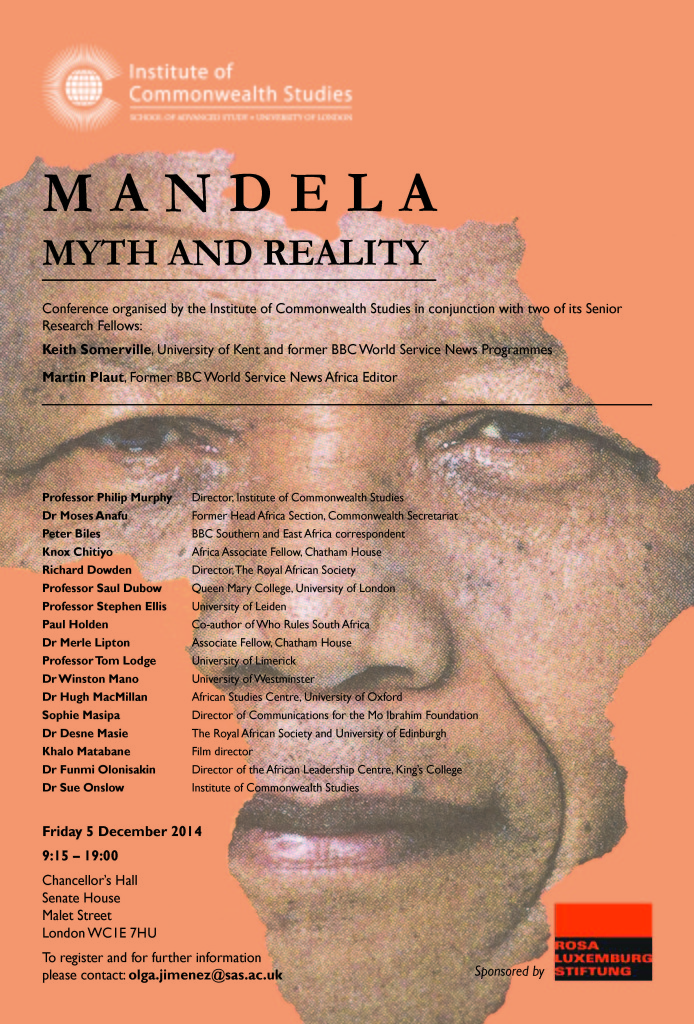 The Institute of Commonwealth Studies is convening a seminar to discuss the complexities of Mandela’s ideology, political relationship with other liberation movements within South African society, his record as the first black President of South Africa; and his contribution to South Africa’s reintegration in the international system , after decades of ostracism.
The Institute of Commonwealth Studies is convening a seminar to discuss the complexities of Mandela’s ideology, political relationship with other liberation movements within South African society, his record as the first black President of South Africa; and his contribution to South Africa’s reintegration in the international system , after decades of ostracism.
5th December 2014 marks the first anniversary of his death. At his passing, an enormous amount of media material was produced reflecting on multiple aspects of his life and work: a considerable amount of this was relatively superficial, and understandably hagiographic. Now more time has passed, there is both opportunity and need for a more dispassionate assessment of the complexity of the Mandela phenomenon: the continuing importance of debates about the armed struggle and his relationship with the SACP; Mandela, the ANC and Africa during the liberation struggle; the role and position of Mandela in the overall South African liberation struggle and relations within the ANC and with other movements and strands of thought, including Black Consciousness; serious discussion of his place in the critical time of negotiated transition; and a sober assessment of Mandela’s record in office, as revolutionary leader turned administrator, and national leader in the rapidly changing post-Cold War world; and his role in Africa and the international system. This seminar intends to contribute to the on-going debate of myths versus realities of Mandela, and the complexities of his legacy.
The conference is being organised by the ICWS, in conjunction with two of its Senior Research Fellows, Keith Somerville (former BBC World news programmes editor and currently Lecturer in Humanitarian Communications, Centre for Journalism, University of Kent; and Martin Plaut (Africa Editor, BBC World Service News).
Venue: The Chancellor’s Hall (Senate House, first floor), Malet Street, London WC1E 7HU
Date and Time: 5 December 2014, 09:45 – 19:00
Please register here
Current Programme*
(*Please note this may be subject to change, due to circumstances outside the organisers’ control.)
9.15 Registration & Coffee
9.45 Welcome: Professor Philip Murphy
10-12.00 Chaired by Dr Sue Onslow
Khalo Matabane – film and documentary maker. Screening of his Mandela documentary and Q&A on the making of the documentary and representing Mandela to South African audiences.
12-13.00 Lunch
13.00- 15.00 Liberation and myth-making: Ideology & Politics:
(The themes of this panel will cover the debate over Mandela’s relationship with the South African Communist Party [SACP] and whether it matters; Mandela as a leading ANC figure, THE embodiment of the South African liberation struggle; Mandela and independent Africa during the liberation struggle)
Chair: Keith Somerville
Speakers: Professor Stephen Ellis, University of Leiden – Mandela, the Communist Party and the origins of South Africa’s armed struggle
Professor Tom Lodge, University of Limerick – Mandela’s emergence as a leader, answering these questions: “What qualities did he possess? How where they developed and what influences shaped his emergence as a leader of the ANC and then as President.
Dr Moses Anafu, former Head of Africa section, Political Affairs Division, Commonwealth Secretariat, and Commonwealth Secretary-General, Chief Emeka Anyaoku’s Special Envoy to South Africa 1991-1994 – Mandela and the transition.
Dr Hugh MacMillan, University of Cape Town and African Studies Centre, University of Oxford – Mandela’s trip through Africa in 1962 and its repercussions; Mandela – the Zambian connection through to his first visits to Lusaka in 1990; Kaunda and negotiations about his release, including the Eminent Persons Group.
Discussant: Saul Dubow, Queen Mary College, University of London.
15.00-15.15 Coffee
15.15-17.15 The Reality of Power and Mandela’s leadership role – the economy, government and foreign policy:
Chair: Martin Plaut
Speakers: Dr Funmi Olonisakin, Director of the African Leadership Centre, King’s College, London – Mandela and leadership in Africa
Dr Desne Masie, Royal African Society and University of Edinburgh Business School – Mandela’s Economic Legacy: Evaluating Socio-economic Inequality in South Africa’s Political Economy
Knox Chitiyo, Associate Fellow, Africa Programme, Chatham House; formerly Nelson Mandela Fellow at RUSI – Mandela and Southern Africa
Paul Holden – co-author (with Martin Plaut) of Who Rules South Africa (2012) – Mandela, government corruption and the arms deal.
Discussant: Dr Merle Lipton, Associate Fellow, Royal Institute of International Affairs
1715-1725 Interval
1725-1845 Mandela and the media – the construction of the image of an icon
Chair and discussant: Professor Winston Mano, University of Westminster
Speakers: Peter Biles, former BBC Southern and East Africa correspondent – Mandela the President and the Media. An examination of the global media image of Mandela including before his imprisonment, in the transition period and covering his relationship with the media as president and as a retired president but key public and international figure.
Richard Dowden, Director of the Royal African Society – The construction of the Mandela image by the ANC and the continued use in the 2014 elections, six months after his death.
18.45 pm Reception
